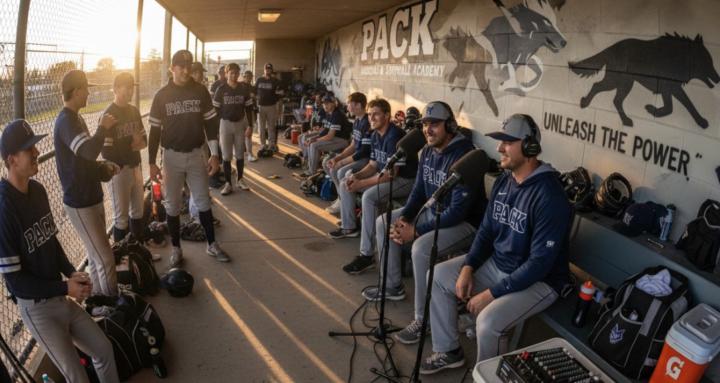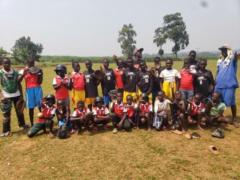May '24 (edited) • "Inside The Dugout"
Interview with Larissa Mills - Founder & CEO of The Mental Game Academy
The Impact of Technology on Youth Development
In today's digital age, the pervasive influence of technology, particularly smartphones, has significantly altered the landscape of youth development. Children and teenagers are spending an unprecedented amount of time on their devices, often at the expense of essential life skills. Research indicates that by the age of 16, young people have spent approximately 18,000 hours on their phones, leading to a concerning gap in social skills, emotional regulation, and cognitive development. This shift has profound implications, especially for young athletes who are expected to perform at high levels. The challenge lies in balancing technology use with the development of critical interpersonal skills and mental resilience.
Understanding the Mental Game Academy's Approach
The Mental Game Academy (MGA) is dedicated to addressing the mental and emotional challenges faced by young athletes in the context of their digital lives. By focusing on mental resilience, MGA equips athletes with the tools they need to navigate the pressures of competition while managing their technology use. The academy's programs are designed to help athletes regain control over their mental state, reduce phone dependency, and enhance their performance. Through structured training, athletes learn to cope with setbacks, manage their emotions, and develop a growth mindset, all of which are crucial for success both on and off the field.
The Role of Parents in Managing Technology Use
Parents play a pivotal role in shaping their children's relationship with technology. Establishing boundaries around phone use is essential for fostering healthy habits. Simple strategies, such as keeping phones out of the bedroom at night, implementing no-phone zones during family meals, and encouraging device-free activities, can significantly improve family dynamics and communication. By modeling healthy technology use and engaging in open discussions about the impact of screens on mental health, parents can help their children develop a balanced approach to technology that prioritizes real-world interactions and emotional well-being.
Building Resilience Through Structured Programs
MGA's structured programs focus on building resilience in young athletes by addressing the mental gaps created by excessive phone use. Over an eight-week course, participants engage in activities that promote self-awareness, emotional regulation, and effective communication. These programs not only enhance athletic performance but also foster personal growth. Athletes learn to manage their emotions during high-pressure situations, cope with mistakes, and maintain focus, ultimately leading to improved outcomes in their sports and personal lives. The success stories from MGA highlight the transformative power of mental training in helping athletes achieve their goals.
The Connection Between Mental Health and Athletic Performance
The relationship between mental health and athletic performance is well-documented. Athletes who struggle with anxiety, stress, or emotional regulation often find it challenging to perform at their best. By addressing these mental health concerns, MGA empowers athletes to unlock their full potential. The academy emphasizes the importance of mental well-being as a foundation for success in sports. By equipping athletes with coping strategies and resilience-building techniques, MGA helps them navigate the pressures of competition while maintaining a healthy mindset.
Creating a Supportive Community for Young Athletes
A supportive community is vital for the development of young athletes. MGA fosters a sense of belonging among participants, encouraging them to share their experiences and challenges. This community aspect not only enhances the learning experience but also helps athletes realize they are not alone in their struggles. By connecting with peers who face similar challenges, athletes can build camaraderie and support networks that extend beyond the academy. This sense of community is essential for promoting mental health and resilience, as it provides a safe space for athletes to express themselves and seek guidance.
The Importance of Coaching in the Digital Age
Coaches play a crucial role in shaping the experiences of young athletes. As the landscape of youth sports evolves, coaches must adapt their approaches to address the unique challenges posed by technology. By understanding the impact of screen time on behavior and performance, coaches can implement strategies that promote mental resilience and focus. Training programs like those offered by MGA provide coaches with the tools they need to manage athlete behavior effectively and create a positive team culture. This holistic approach ensures that athletes receive the support they need to thrive both on and off the field.
The Future of Youth Sports: Balancing Technology and Mental Resilience
As technology continues to evolve, the future of youth sports will depend on finding a balance between digital engagement and mental resilience. Organizations like MGA are at the forefront of this movement, advocating for a comprehensive approach to athlete development that prioritizes mental health. By equipping young athletes with the skills to navigate their digital lives while fostering resilience, we can create a generation of athletes who are not only successful in their sports but also well-rounded individuals. The journey toward achieving this balance requires collaboration among parents, coaches, and athletes, all working together to promote a healthier, more sustainable approach to youth sports.
Conclusion: Empowering the Next Generation of Athletes
In conclusion, the challenges posed by technology in the lives of young athletes are significant, but they are not insurmountable. By prioritizing mental resilience and fostering healthy technology habits, we can empower the next generation of athletes to succeed both in their sports and in their personal lives. The Mental Game Academy serves as a valuable resource for athletes, parents, and coaches alike, providing the tools and support needed to navigate the complexities of the digital age. Together, we can create a brighter future for young athletes, one that emphasizes mental well-being, resilience, and the importance of real-world connections.
3
3 comments

skool.com/trainwithpack
Pack Coaching: Weekly Zooms, personalized & expert guidance. Get one-on-one coaching and insight to build a skilled, united, and competitive team!
Powered by





